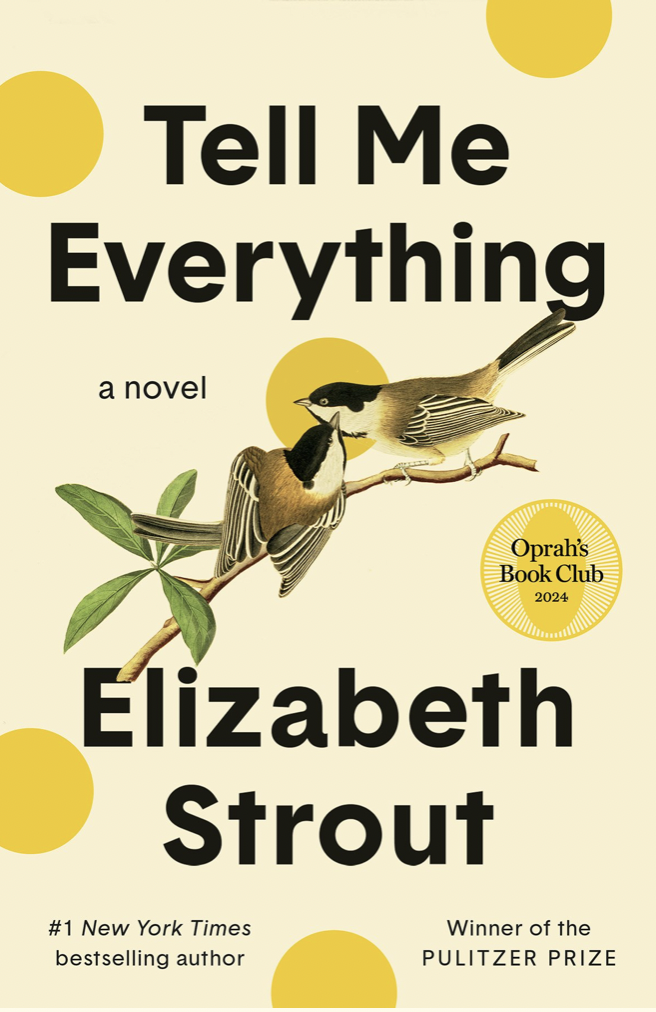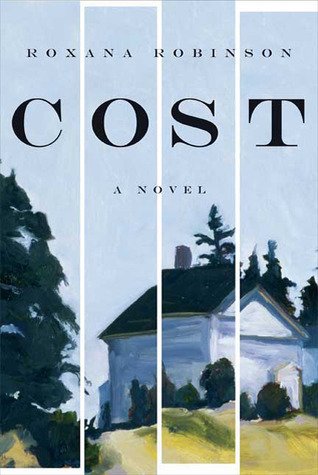
Recent Reviews

Tell Me Everything by Elizabeth Strout
With great insight, Elizabeth Strout’s newest novel probes the complexity of human relationships. How well can we know another person? How well can we know ourselves? She concludes not well: “We are all such mysteries.” But her novel offers an antidote to this isolation. Listening to other people’s stories connects us to them and causes us to empathize with their plight. Exchanging stories is a gift we can give to ourselves and others.
This character-driven novel takes place in the fictional town of Crosby, Maine. We have met the protagonists in Strout’s prior books: Bob Burgess, Lucy Barton, and Olive Kittridge. The plot revolves around their deepening friendships, the stories they share, and the murder of an elderly woman on the outskirts of town.
Strout’s characters are defined by the traumas (often unknown to others) that shaped their journey. Her characters’ ordeals occurred in their childhoods and have been the engine (consciously or unconsciously) driving their lives. Olive Kittredge says, ‘If you don’t think everyone is broken in some way, you’re wrong.” The novel’s characters have endured sexual abuse, suicide, alcoholism, disease, divorce, poverty, and the guilt of accidentally killing a parent.
The novel has a wistful tone as the characters wrestle with themselves and those they encounter. They share their fears and worries, their joys and pleasures, and the stories they hear about other people in town. Just when you are about to judge a character’s cruel action or poor choice, the character’s background is revealed, and you feel compassion instead.
The book can sometimes feel like a quirky collection of short stories. Still, Strout weaves them into an existential narrative about how people overcome their hardships and connect with others. Lucy Barton states, “People just live their lives with no real knowledge of anybody.”
In this world filled with so much suffering, Strout suggests that listening to others without judgment is a gift of love and the only antidote to the existential loneliness of our minds. This novel is poignant, provocative and packed with insights. I highly recommend Tell Me Everything. 5/5

beyond that, the sea by Laura Spence-Ash
There is heart and soul in this beautiful novel by Laura Spence-Ash. Her writing is layered with astute reflections about familial love, conflicting loyalties, time passing, and the long road to understanding and forgiveness. The writing is warm and intimate, and there is no violence or treachery. As of April 2024, this is my favorite book of the year.
In 1940, when the German bombing of London became acute, Reg and Millie Thompson sent their only child, Beatrix, to America to keep her safe. After a two-week boat ride to Boston, an angry and frightened 11-year-old Beatrix meets Ethan and Nancy Gregory and their two sons, William and Gerald. She is warmly welcomed, assigned her own room and spends five formative summers with her new family on their private island in Maine. Nancy Gregory bathed her gently when she arrived. Ethan Gregory taught her to swim. William and Gerald seamlessly included her in their adventures. Her initial fear and loneliness gave way to feelings of comfort and inclusion. The Gregory’s come to love Beatrix, whom they now call Bea, and she comes to love them. Her life is changed forever, as is theirs.
Bea's parents hoped their daughter would be safe and happy and far from the danger in London. "They sent her away so she could have a childhood. They hadn't realized, though, that their decision meant that her childhood would, instead, be taken away from them." When the war ends, Bea is back on a boat to London. She doesn't want to return and would rather stay in this happy home with people who pay close attention to her needs. After five years away from London, Bea’s American family's warmth and emotional habits comfort her.
But to her London home, Bea returns.
Each of the Gregory family members feels Beatrix's absence. They leave her bedroom intact. After the war, the Gregory family members send Bea letters, and William visits Bea in London. As they move through their twenties and thirties, both sons miss Bea and struggle to find peace in their adult relationships. Meanwhile, Bea is angry with her mother and strives to establish her life in London as an adult. The war years were a formative and life-changing experience for Beatrix, her parents and the Gregory family. Each of these eight characters shares the narration, a testament to Spence-Ash's writing skills.
Gentle and warm, Spence-Ash combines descriptions of daily activities with an emotional log. The story is told over decades and illuminates the evolving bond between Bea and the Gregory’s, (especially the two sons) and the expanding distance between Bea and her parents. The past persistently hovers in each character's thoughts as they wrestle with their complicated and conflicted feelings. The novel reads like the journals of these eight characters as they each sort out their feelings about that monumental and influential time in their lives. This quiet novel is filled with grace. 5/5

Cost by Roxana Robinson
I recently reread Roxana Robinson’s 2008 novel Cost. If you haven’t read this book, you are in for a treat. Not because the story is happy—it is not—but because Robinson is a gifted connoisseur of deconstructing family dynamics. Her elegant prose penetrates the emotional interiority of her characters with precision and empathy.
On one level, the story is about a 22-year-old man named Jack Lambert, who is a heroin addict. On another level, the story is about how a destructive family dynamic is passed from generation to generation, resulting in one family member unconsciously being assigned to carry the burden of the damage.
Jack’s parents, Julia and Wendell, are divorced. When Jack’s older brother Steven tells his parents that Jack’s drug use has become dangerous, they each choose denial, but soon an intervention is arranged. Jack’s parents, brother, grandparents, and aunt gather at Julia’s summer home in Maine. When the addiction counselor asks them to write about what they love about Jack, they all bristle. “Love is not a word their family used.” Though the family members have pleasant public personas, their past anger, hurt and distrust lurks when they are together.
Robinson writes about Jack’s heroin addiction with intimacy and captures the obsessive thoughts of an addict looking for his next fix. She also depicts the emotional cost to Jack’s family as his stealing and lying intrude on their lives. Their feelings alternate between grief and guilt to fury and rage. This theme propels much of the plot.
(Spoiler Alert) However, the more compelling theme is the family dynamic that has pathologized Jack since childhood. “He was always a wild center of the storm.” Jack carried the burden of his parents’ and even his grandparents’ choices. The ambiguity of Jack’s paternity was never discussed. It was unconsciously known. Jack’s father Wendell says at the intervention, “I think I was too hard on Jack.” And then later, “It’s like hearing that he is Chinese or that he’s not my son.” Wendell knows and doesn’t know, and Julia is not sure.
This powerful novel about the scourge of heroin addiction and the scourge of toxic family dynamics long ignored is heartbreaking. Robinson’s ability to illuminate each family member’s past and present interiority is extraordinary. Jack pays a painful price for his addiction as does his family. Eventually, there can be a cost of not dealing with the past. 5/5
